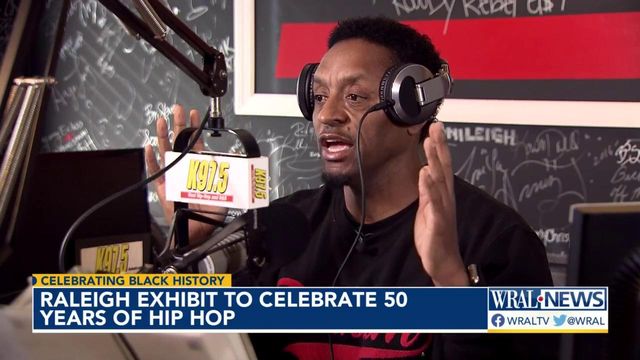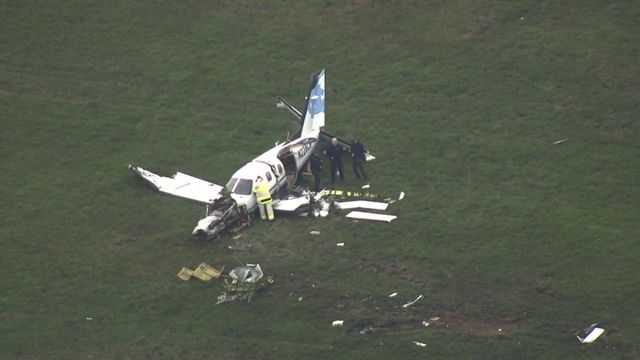'We control our voice:' Raleigh, Triangle HBCUs play a role in the history of hip-hop
North Carolina often isn't top of mind when thinking about the birth of hip-hop music and culture. However, historically Black colleges and universities like St. Augustine, Shaw and North Carolina Central University played a huge role in the transformative culture.
Hip hop was born on August 11, 1973, at a party in the Bronx. At the time, DJ Kool Herc was hosting a back-to-school jam, completely unaware how his parties and music would someday transform into a phenomenon.
Bill Murphy, who works at the Radio One R&B and hip-hop station in Raleigh, was at that first party almost 50 years ago.
“I was 14 years old and running around in New York, going to any outdoor party. It really started that way," recalls Murphy.
Hip-hop grew to touch every corner of the world, inspiring fashion, art and even changing the trajectory for many Black lives.
Songs that highlight life experiences like poverty and crime
“It started from people that had nothing," says Grady Bussey, a board member at the City of Raleigh Museum. "If you think about the history of the Afro American experience, a lot of the songs as came through struggle became things that became monumental."
Bussey says many hip-hop songs explore life experiences of the artists, touching on hard topics like poverty and crime.
"You create a picture where a lot of Americans may not have any idea that these things were happening, and it gave them the opportunity to utilize talent and be able to help tell the world the stories of what was going on in places,” explains Bussey.
“We must highlight the culture so we can get the positive stories. What did it do for people? How many people has it taken off the streets? How many people are taken out of poverty? How many people has it given a purpose to?” says Radio One radio personality Brian Dawson.
The growth of hip-hop in Raleigh and North Carolina as a whole
While hip-hop wasn't born in North Carolina, it did grow deep roots here over the past 50 years.
During the Great Migration, many Black families moved up north to escape Jim Crow laws in the South. However, after the emergence of hip-hop music, Bussey says there was a 'New Great Migration,' during which Black families moved back South.
"At that time, there was an amazing influx of people attending HBCUs,” he says.
From St. Augustine, to Shaw University and North Carolina Central University, extraordinary artists were all across the Triangle.
Artists like Lords of the Underground came out of Shaw University. St. Augustine University brought us Yagg-Fu Front. NC Central University gave rise to Sunshine Anderson.
"Grammy-nominated producer Travis Cherry from St. Aug's managed the Migos, Cardi-B, Lil and Yachty," says Bussey.
In honor of the 50th anniversary of hip-hop, the City of Raleigh Museum is collecting photos for an exhibit to highlight that culture in North Carolina.
“The City of Raleigh recognizes that we have the ability to cultivate the hip-hop experience here in Raleigh," says Bussey.
The origins of hip-hop culture, breakdancing and battles
Murphy recalls the unique trajectory of hip-hop's growth, as it grew to include breakdancing and battles.
Breakdancing became a natural part of moving to the hip-hop rhythm. Most of the music had breaks in the middle, where they'd play drumbeats. DJs started playing the drum beat on different turntables, back and forth.
"That was called break music," says Murphy. "Breakdancing became part of that."
He also recalls how DJ battles grew in popularity.
"Back in the day, hip-hop was really DJs, and the guy on the microphone was just a hype guy," he recalls. "We were at hotels where we had battles. Some of the real guys who started hip-hop are different than the ones we think about, like Pop DJ Hollywood and DJ Jones in New York and King Charles."
Hip-hop also created a very different medium for music.
“Back in the 80s and 90s, we were the ones that would listen to our DJs at night and use the tape recorder and tape it,” says Bussey.
"It was Grandmaster Flash and the Furious Five to turn that around and equal that – the first hip-hop mixtape," says Murphy.
'We can control our voice:' Preserving hip-hop history for the next generation
As the 50th anniversary of hip-hop approaches, Dawson says he believes educating the younger generation is a priority.
"J. Cole, DaBaby, shout out to Petey Pablo," he says. "It's just been a great culture. So I'm excited to see where we can go. We can control the medium. We can control our voice,” said Dawson.
The City of Raleigh Museum has created multiple events to engage the public and celebrate hip-hop history. Here is the list of events planned at the museum:
History of North Carolina Hip-Hop
- August 12 from 10 a.m. to noon
- The City of Raleigh Museum has partnered with local hip-hop local legends and pioneers to discuss the evolution of hip-hop music in Raleigh, Wake County and North Carolina.
Hip-Hop Sneaker Ball
- August 12 from 6 -10 p.m.
- Celebrate the history of Hip Hop Music at the city of Raleigh Museum! Come out in your best hip-hop fashion and dance the night away. Legendary DJs, photo booth, VIP area, hip-hop archive display, and more.
Collecting historic hip-hop photos
- In addition to the events, the City of Raleigh Museum has created a campaign to collect photos of historic hip-hip artists and moments in North Carolina. The museum plans to archive them and display the pictures at the Hip-Hop Sneaker Ball.











